unit 12
人教版英语九年级全一册--短语表 Unit 12

序号英文中文1be full of ...=be filled with..充满了...2take a shower=get in the shower洗淋浴3by the time在..以前;到...时候为止4by dinner time在晚饭以前5get outside出去6leave my keys in the backpack把钥匙落在包里7get /go back to school=return toschool返回学校8walk /go into...走进..9be late for ...上课迟到10go off闹钟大响11keep doing sth.一直不断地做某事12wake up醒来13rush out the door冲出大门14rush to...冲向...15brush one's teeth刷牙16wash one's face洗脸17give sb a lift /ride捎某人一程;让某人搭便车18at least至少19get to =arrive in/at到达20end up doing sth.以做某事结束21be about to do sth.打算做某事22decide to do sth.决定做某事23even though =even if即使24wait in line with与..排队等候25what'sgoing on?=what'shappening?发生什么事了?26in disbelief难以置信地27stare at紧盯着地面28jump out of ...从..跳起来29go straight to..径直奔向...30take off起飞;脱掉31hear about /of听说;得知32turn into变为;转化为33show up赶到;露面人教版英语九年级全一册短语--Unit 1234forget to do sth忘记去做某事35forget doing sth.忘记做过某事36say goodbye to sb向某人道别37say hello to sb向某人问好38leave for离开..去..39by the end of ...到..末为止40get dressed穿衣服41run out of ..用光42the most believable最可信的43the least believable最不可信的44run away from...逃离45 on the first day of school在开学的第一天46on one's back在某人的背上47in the middle of the road在路的中间48turn around掉头49lead to通向;导致50make an unexpected discovery有了一个意想不到的发现51cancel the plan取消计划52hand in上交53walk home from school从学校步行回家54change the clock to an hourearlier把闹钟调得比原来快一个小时。
人教版九年级英语课件:Unit12(共49张PPT)
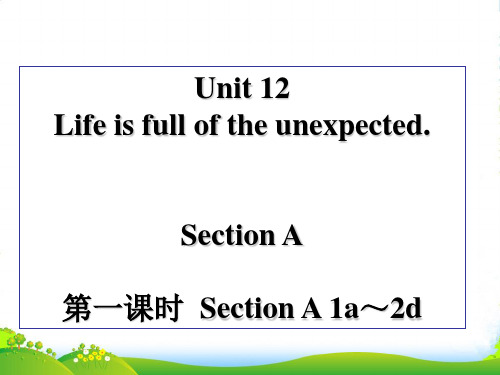
2. As I was waiting in line with other office workers, I
heard a loud sound. 当我正在和其他办公室职员排队时,我听到了一声巨响。 as意为“当……的时候”,as可表示主句和从句的动作 同时发生或同时持续,引导时间状语从句。 如:As years go by, China is getting richer and stronger. 随着时间一年一年地过去,中国变得越来越富强了。
A. begins B. begin C. beginning D. have begun ( C)(2)I ____ do my homework when my father came in.
A. am going to B. was going C. was about to D. am about to
课堂同步
一、阅读课本第90页2d,回答问题。 1. Why was Kevin late for class? _B__e_ca_u_s_e_h_i_s_a_l_a_rm__c_l_o_c_k_d_i_d_n_’t_g_o__o_ff_._________ 2. Did he eat breakfast? _N__o_, _h_e_d_i_d_n_’t_.____________________________ 二、阅读课本第90页2d,选择正确答案。 (C )1. What time did Kevin wake up?
课文导学
人教版英语九年级全册Unit 12知识点详解及练习
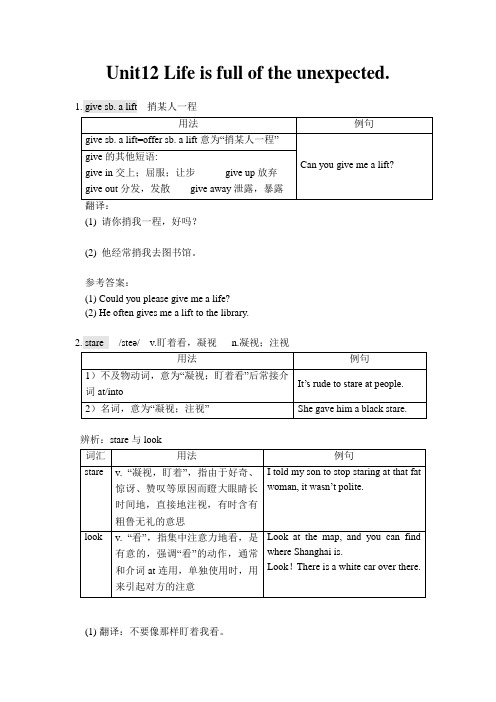
Unit12 Life is full of the unexpected.1. give sb. a lift 捎某人一程(1) 请你捎我一程,好吗?_______________________________________________________________ (2) 他经常捎我去图书馆。
_______________________________________________________________ 参考答案:(1) Could you please give me a life?(2) He often gives me a lift to the library.2. stare /steə/ v.盯着看,凝视n.凝视;注视辨析:stare与look(1)翻译:不要像那样盯着我看。
___________________________________________________________________ (2) Emily ____ the young man hard and finally shamed him into giving up his seatto the old lady.A. stared onB. stared atC. stared forD. stared with参考答案:(1) Don’t stare at me like that.(2) B3. above /əˈbʌv/ prep.在...上面adv.在上面辨析:above,on与over选词填空:above/on/over(1)The plane is flying _____ the clouds.(2)There are five books _____ the desk.(3)There is a bridge _____ the river.(4)I hope the price of the dress will not be____$20.参考答案:(1)above (2)on (3)over (4)above4. burn /bɜ:n/ v.着火;燃烧burn--burnt / burned--burnt / burned辨析:burn, burned与burning(1)翻译:燃烧的旅馆位于城市中心。
牛津版六年级上册Unit 12 知识点总结

Unit 12 知识点总结【单词】Earth, part, forest(可数), land(不可数), ocean(可数), rubbish(不可数), sick, recycle, glass, own, so many, pick up, shopping bag, plastic bag, save 拯救;节约cut — cut(过去式)cut — cut t ing(现在分词形式)【短语】1.cut down 砍倒2.live on 住在......上We live on the Earth.3.work together 一起工作4.keep the Earth clean and healthy5.pick up6.plant trees7.ride a bike more oftenride bikes more often【语法】1.should + 动词原形2.stop + 动词ing3.so many 这么多+ 可数名词复数4.anything 用于疑问句和否定句Can we do anything to help the Earth?something一般用于肯定句5.throw...into...把......扔进......里6.write on...写在......上We should write on both sides of paper.我们应该在纸的两面书写。
【句子】1.We should stop cutting down so many trees.2.It’s the E arth.3.The green and brown parts are forest s and land.4.The Earth was very clean and beautiful in the past, but now some parts are dirty.7.We should stop throwing rubbish into rivers(河流;可数名词).8.We should stop cutting down so many trees.9.We should stop using plastic bags.10.We live on the Earth. The Earth is a beautiful place. There are rivers, oceans, land and forests. There are many different plants and animals too.11.Smoke from cars and factories makes the air dirty. The Earth gets sick (get sick 生病).12.Now people work together to keep the Earth clean and healthy. They pick up rubbish. They plant trees every year.13.They recycle glass and paper. They bring their own shopping bags and stop using plastic bags.14.We should not litter(动词;扔垃圾).【写作】P.85 Think and writeThe Earth is sick!The Earth was clean and beautiful. Now some parts are dirty. We should stop throwing rubbish into rivers and oceans. We should stop cutting down so many trees.We should stop using plastic bags. We should pick up rubbish. We should plant trees every year. We should recycle glass and paper. We should work together to keep the Earth clean and healthy.。
人教版九年级英语Unit12知识点总结
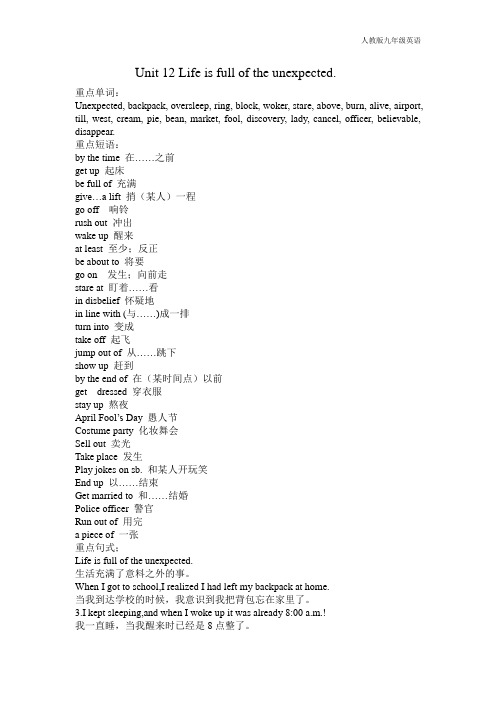
Unit 12 Life is full of the unexpected.重点单词:Unexpected, backpack, oversleep, ring, block, woker, stare, above, burn, alive, airport, till, west, cream, pie, bean, market, fool, discovery, lady, cancel, officer, believable, disappear.重点短语:by the time 在……之前get up 起床be full of 充满give…a lift 捎(某人)一程go off 响铃rush out 冲出wake up 醒来at least 至少;反正be about to 将要go on 发生;向前走stare at 盯着……看in disbelief 怀疑地in line with (与……)成一排turn into 变成take off 起飞jump out of 从……跳下show up 赶到by the end of 在(某时间点)以前get dressed 穿衣服stay up 熬夜April Fool’s Day 愚人节Costume party 化妆舞会Sell out 卖光Take place 发生Play jokes on sb. 和某人开玩笑End up 以……结束Get married to 和……结婚Police officer 警官Run out of 用完a piece of 一张重点句式;Life is full of the unexpected.生活充满了意料之外的事。
When I got to school,I realized I had left my backpack at home.当我到达学校的时候,我意识到我把背包忘在家里了。
Unit 12
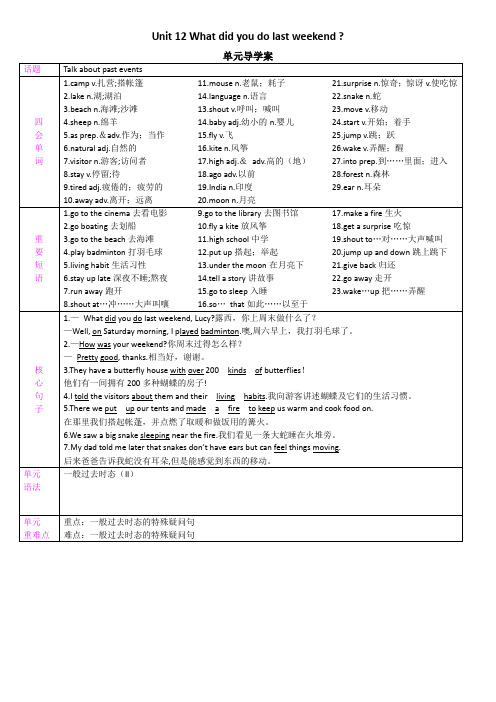
Unit 12 What did you do last weekend ?第一课时Section A (1a~2d)自主预习案学生自学新单词(教材P67-68),比一比,看谁记得又快又准。
1.camp v.扎营;搭帐篷ke n.湖;湖泊3.beach n.海滩;沙滩4.sheep n.绵羊5.as prep.&adv.作为;当作6.natural adj.自然的7.visitor n.游客;访问者8.tired adj.疲倦的;疲劳的9.stay v.停留;待学生自查并写出本课短语(教材P67-68),读一读,记一记。
1.go to the cinema 去看电影2.go boating 去划船3.go to the beach 去海滩4.play badminton 打羽毛球5.living habit 生活习性6.stay up late 深夜不睡;熬夜湖边野营Step 1 情景导入Teacher:How was your last weekend?Student1:It was very good.Teacher:What did you do last weekend?Student 1:I milked the cows.Teacher:What did you do last weekend?Student 2:I visited my grandmother.…环节说明:由师生问答的形式直接引出本节课要学的语言目标一般过去时态,简单明了,直奔主题。
Step 2 完成教材1a-1c 的任务1.教师领读1a中的单词或词组,学生跟读并且识记,然后两人一组互相提问。
2.认真观察图片,将图片和1a中所给的短语匹配,集体核对答案,完成1a。
3.大声朗读图片中的小对话,为听力训练做好准备。
4.认真听录音,根据听力内容在每张图片上填上事情发生的时间morning, afternoon和evening。
人教版九年级英语Unit12单词、课文知识梳理,词汇句式精讲
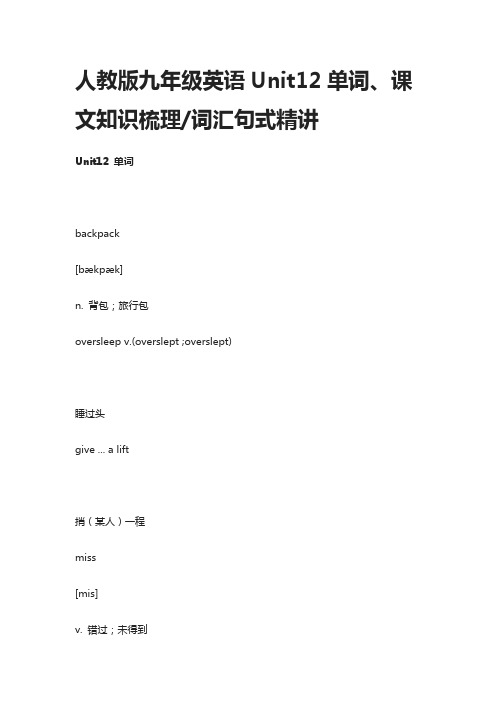
人教版九年级英语Unit12单词、课文知识梳理/词汇句式精讲Unit12 单词backpack[bækpæk]n. 背包;旅行包oversleep v.(overslept ;overslept)睡过头give ... a lift捎(某人)一程miss[mis]v. 错过;未得到unexpected[ʌnikspektid]a.出乎意料的;始料不及的block[blɔk ]n. 街区worker[wə:(r)kə(r)]n. 工作者;工人stare[steə]v. 盯着看;凝视disbelief[disbili:f]n. 不信;怀疑above[ əbʌv]adv. 在上面;向上面pre在上面burn[bə:(r)n]v. (burnt; burned ) 着火;燃烧alive[ əlaIv]adj. 活着;有生气的take off(飞机等)起飞;匆忙离开till[til]conj. & pre到;直到west[west]adv. 向西;朝西adj. 向西的;西部的n. 西;西方cream[kri:m]n. 奶油;乳脂boss[bɔs]n. 老板;领导pie[pai]n. 果馅饼;果馅派course[kɔ:(r)s]n. 课程bean[bi:n]n. 豆;豆荚[ma:(r)kit]n. 市场;集市costume[kɔstju:m]n.服装;装束embarrassed [imbærəst] adj.窘迫的;害羞的announce[ ənauns]v. 宣布;宣告spaghetti[spəgeti]n. 意大利面条hoaxn. 骗局;恶作剧discovery[diskʌvəri]n. 发现;发觉lady[leidi]n. 女士;女子officer[ ɔfisə]n.军官;官员believable[bili:vəbl]adj.可相信的;可信任的embarrassing[imbærəsiŋ]a. 使人害羞的(难堪的或惭愧的)New Zealand[nju:zi:lənd]新西兰Italy[Itəli]意大利Mars[ma:(r)z]火星Carl[ka:(r)l]卡尔(男名)OrsonWelles[ɔ:(r)sən; welz]奥森•韦尔斯Unit12 知识梳理【重点短语】1. take a shower洗浴2. leave my backpack at home 把背包忘在家里3. get back to school 返回学校4. start teaching 开始教学5. go off 响铃6. rush out the door 冲出房门7. give sb a lift 捎某人一程8. miss both events 错过两个事件9. full of unexpected 充满着不可预知性10. be about to do sth 正要做某事11. stare in disbelief at 难以置信地盯着。
初一下册英语第十二单元讲义unit 12 语法篇
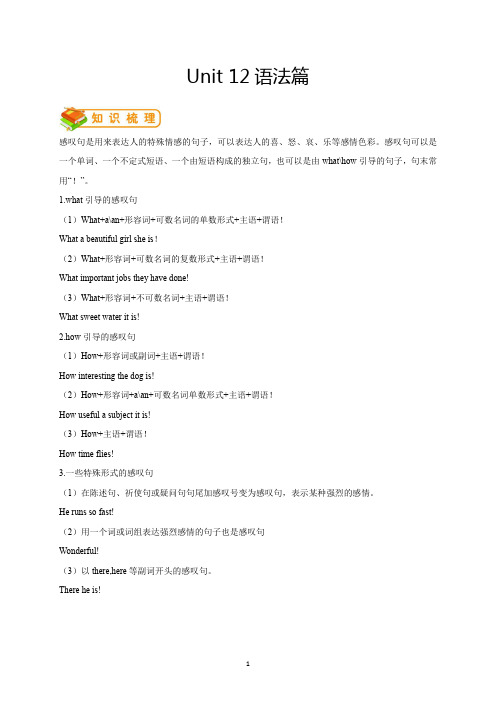
Unit 12语法篇感叹句是用来表达人的特殊情感的句子,可以表达人的喜、怒、哀、乐等感情色彩。
感叹句可以是一个单词、一个不定式短语、一个由短语构成的独立句,也可以是由what\how引导的句子,句末常用“!”。
1.what引导的感叹句(1)What+a\an+形容词+可数名词的单数形式+主语+谓语!What a beautiful girl she is!(2)What+形容词+可数名词的复数形式+主语+谓语!What important jobs they have done!(3)What+形容词+不可数名词+主语+谓语!What sweet water it is!2.how引导的感叹句(1)How+形容词或副词+主语+谓语!How interesting the dog is!(2)How+形容词+a\an+可数名词单数形式+主语+谓语!How useful a subject it is!(3)How+主语+谓语!How time flies!3.一些特殊形式的感叹句(1)在陈述句、祈使句或疑问句句尾加感叹号变为感叹句,表示某种强烈的感情。
He runs so fast!(2)用一个词或词组表达强烈感情的句子也是感叹句Wonderful!(3)以there,here等副词开头的感叹句。
There he is!选择疑问句提出两种或两种以上的情况,要求对方选择一种情况回答的问句叫选择疑问句。
选择疑问句中的两种或两种以上的情况用or连接,回答时不能使用yes或no,而要用一个完整的句子或其省略形式。
读选择疑问句时,语调一般是前升后降。
选择疑问句可以分为一般选择疑问句和特殊选择疑问句两种。
(1)一般选择疑问句:一般疑问句+or+被选择部分?--Do you like apples or bananas?--I like apples.(2)特殊选择疑问句:特殊疑问句,+A or B?--Which would you like better,tea or coffee?--Coffee better.单项选择1.__________great courage he showed!A.WhatB.What aC.How aD.How2.__________exciting news it is!A.WhatB.What anC.HowD.How an3.--__________a lovely girl she is!--So she is!A.WhatB.What aC.HowD.How a4.--Do you like listening pop music__________classic music?--Classic musicA.andB.orC.soD.but5.--__________do you like better,football or basketball?--Basketball.A.WhichB.WhereC.WhyD.What单项选择1. __________fast runner she is!A.WhatB.What aC.HowD.How a2.__________great picture!A.WhatB.What aC.HowD.How a3.__________bad weather it is!We can’t go boating.A.WhatB.What aC.HowD.How a4.--Can you tell me it is a dog_________a bear?--A dog.A.andB.orC.soD.but5.--__________do you want to visit,America or Canada?--Canada.A.WhichB.WhereC.WhyD.What单项选择1.__________a beautiful car it is!I have never seen it before.A.HowB.WhenC.WhoD.What2.--__________ it is today!--Yes,shall we go fishing?A.How fine weatherB.What fine weatherC.What a fine weatherD.How fine the weather3.--__________fine day!Shall we go for a walk?--That sounds great!A.WhatB.What aC.HowD.How a4.__________delicious the dish is!A.WhatB.What anC.HowD.How an5.__________ good time we had during the May Day holiday!A.HowB.WhereC.WhoD.What6.Who is your maths teacher,Lee_________Wang?A.andB.orC.soD.but7._________excited they are!A.WhatB.What anC.HowD.How an8.--_________is your maths teacher,Lee or Wang?--LeeA.WhoB.WhatC.WhenD.Where9.--It is said that a foreign teacher will teacher will teach us English next term.--Wow!__________!A.What an excited newsB.What a exciting newsC.How excited the news isD.How exciting news10.--Whose book is it,Lucy’s__________Lily’s?--Lily’sA.andB.orC.soD.but完形填空Probably you have seen photos of the Grand Canyon. But you must go there 1 to feel its size and beauty. The Grand Canyon is one of the greatest 2 wonders of the world.The Colorado River made the Grand Canyon over millions of years. Slowly, the river cut down 3 hard rocks. At the same time, the land was 4 . Today the canyon is very 5 . It’s also very 6 , about 20 kilo-meres. And 7 its height, there are different kinds of plants and animals on both sides of the canyon.The canyon looks different at different times of the day, and 8 different seasons and weather. At sunrise, the red, gold, brown and orange colors of the rocks are 9 clear and bright. Whether you see the Grand Canyon from the top or the bottom, it will be a(n) 10 that you will never forget.1. A. you B. your C. yours D. yourself2. A. natural B. modern C. ancient D. national3. A. along B. through C. across D. past4. A. rise B. rising C. rose D. risen5. A. more B. dangerous C. deep D. low6. A. long B. deep C. high D. wide7. A. as a result B. because of C. thanks to D. thanks for8. A. in B. on C. at D. for9. A. especially B. friendly C. hardly D. differently10. A. interview B. trip C. visit D. experience单项选择:1.__________good advice!A.WhatB.What anC.HowD.How an2.__________bad weather it is!We had better stay at home.A.WhatB.What aC.HowD.How a3.__________sweet music!A.WhatB.What aC.HowD.How a4.Playing games__________much time,I think.A.spendsB.takesesD.pays5.My family usually__________ music at the concert on holiday.A.listenB.hearC.hear ofD.listen to6.Mozart wrote__________piece of music for the classic orchestra.A.hundredB.hundreds ofC.hundred ofD.hundreds7.The boy works_________harder than his elder sister.A.evenB.veryC.prettyD.quite8.Sorry,I can’t play __________ basketball with you this afternoon.My father asked me to stay at home and play __________guitar.A.The,theB.\,\C.the,\D.\,the9.She can sing very well.She has a beautiful __________ .A.soundB.noiseC.voiceD.cry10.He will come here on time,__________?A.won’t heB.will heC.doesn’t heD.is he完形填空:Johnny Sylvester, eleven years old, was in bed in the hospital. A few days ago, when he was __1__in a football game, he fell and his head hit the ground. The doctors thought he might ___2____get well.“He seems to have given up hope. So medicine won’t ___3__. Maybe he needs something else,” said one of the doctors. “When I visit Johnny, all he ever says is that he would like to __4___ Babe Ruth.”To meet Babe Ruth, of course, was not possible. Babe Ruth was as important a man in America ___5___the president himself, and he was the most famous baseball player in the game.The next day Johnny’s father managed to __6__Babe Ruth about the story of Johnny on the phone.Twenty-four hours later, when Johnny lay in his ___7___room, in walked Babe Ruth. Young Johnny couldn’t believe it really was Babe.Babe Ruth sat down at Johnny’s bedside and said, “Now listen, kid, you’ve got to get well. I’ve bought you a new American League baseball. You must start ___8____it”Sylvester just stayed there, saying nothing.For Johnny this was the beginning of a new life, one he thought he would never __9__. To his doctors’ __10__, young Sylvester walked out of the hospital on his own a few weeks later. He was also able to live a healthy life---all because of the present of Babe Ruth.1. A. playing B. swimming C. riding D. growing2. A. always B. often C. usually D. never3. A. win B. do C. eat D. drink4. A. feed B. read C. meet D. defeat5. A. as B. than C. if D. until6. A. say B. speak C. tell D. talk7. A. hospital B. school C. village D. farm8. A. reading B. sweeping C. throwing D. making9. A. refuse B. see C. send D. agree10. A. experience B. opinion C. advice D. surprise阅读理解ASeveral summers ago, Joe Smith, the coach of a football team, and his family were spending their holiday in a small town. One rainy afternoon, it was impossible for them to go out to do anything interesting, so the family decided to go to the cinema. Joe, his wife and their children walked down to the town’s only cinema, bought tickets and went into the hall. The lights were still on, and there were just six other people there. As Joe entered, some of them saw him and started clapping (鼓掌).Joe gave th em a smile and turned to his wife. “Aha, I can’t believe they know me and I’m getting a warm welcome here,” he said, “I guess they saw my games on TV.”They sat down and then a young man came over and reached out his hand to shake hands with Joe. “Thanks a lot,” replied the coach, “I just can’t believe you know who I am.” The man looked puzzled (困惑的). “All I know,” replied the man, “is that they would not show the film until at least ten people bought tickets.”1. Joe and his family decided to go to the cinema because _________.A. they enjoyed seeing films in a small townB. it was impossible for Joe and his team to have a football match that afternoonC. they wanted to try something new for a changeD. nothing else could interest them on a rainy afternoon2. When Joe and his family got to the cinema __________.A. all the tickets had been sold outB. the film had been on for quite some timeC. people in the cinema were waiting anxiously (焦急地)D. everyone in the cinema was clapping3. How did Joe feel when he was given such a warm welcome?A. He felt surprisedB. He felt worriedC. He felt proudD. He felt both surprised and proud4. How many children did Joe have?A. At least oneB. At least twoC. At least threeD. At least five5. Why did the people in the cinema welcome Joe and his family so warmly?A. Because he was the coach of a football teamB. Because he and his family were new-comers in the small townC. Because they had seen Joe’s games on TVD. Because they could not see the film until enough people had arrivedBIn the big cities of Europe and America — London, Paris, New York, people are moving out of the city. They are usually rich families with much money, and they want to live a quieter life. They are tired of the noises and the dirty air of the city, tired of the crowded streets, crowded trains and buses. They don’t want to sit in traffic any more. They want a house with a garden, and clean air that is not polluted.So they move ou t. Some don’t move very far, just a little way out of the city, to the towns near the cities. Other people move to real countryside, with sheep, cows and horses, and green fields! There, they start new lives and try to make new friends.Not all those who move from the city to the countryside are happy. After two or three years, many people feel that it was a big mistake. There isn’t much to do. Country people are very different and aren’talways friendly.As a result, quite a lot of people move back to the city. “It’s wonderful to see crowds in the streets and cinema lights,” they say. “I’m so glad I’m back in the city!”1. Some city people move out of their city because of _____.A. crowds and pollutionB. friendly neighborhoodsC. making moneyD. cows and sheep2. Why do some people move back to the city again? Because _____.A. they can breathe fresh and clean airB. there are big shops and cinema lightsC. they still want to live their city lifeD. they can make many new friends3. Which of the following sentence is wrong according to the passage?A. Many people love their city’s colorful life.B. They enjoy seeing animals in the country.C. All the people move out far from the city.D. Sometimes country people are not friendly.CYou are watching a film in which two men are having a fight. They hit one another hard. At the start they only fight with their hands. But soon they begin hitting one another over the heads with chairs. And so it goes on until one of the men crashes (撞击) through a window and falls thirty feet to the ground below. He is dead!Of course he isn't really dead. With any luck he isn't even hurt. Why? Because the men who fall out of high windows or jump from fast moving trains, who crash cars of even catch fire, are well trained. They do this for a living. These men are called stuntmen. That is to say, they perform tricks (花招,手段). Here are two sides to their work. They do most of the things you see on the screen. For example, they fall from a high building. However, they do not fall on to hard ground but on to empty cardboard boxes covered with a mattress (床垫). Again, when they hit one another with chairs, the chairs are made of soft wood and when they crash through windows, the glass is made of sugar! But although their work depends on trick of this sort, it also requires a high degree of skill and training. Often a stuntman success depends on careful timing. For example, when he is "blown up" in a battle scene, he has to jump out of the way of theexplosion just at the right moment.Naturally stuntmen are well paid for their work, but they lead dangerous lives. They often get seriously hurt, and sometimes killed. A Norwegian stuntman, for example, flew over the edge of a cliff (悬崖) a thousand feet high. His parachute (降落伞) failed to open, and he was killed. Although it is full of deadly dangers, this is no longer the work for men only. Men no longer dress up as women when actresses have to perform some dangerous actions. For nowadays there are stuntman too!1. Stuntmen are those who ______.A. often dress up as famous actorsB. prefer to lead dangerous livesC. often perform dangerous actionsD. often fight each other for their lives2. What’s the meaning of the underlined sentences in the first paragraph?A stuntman should _______.A. crash bravely though a window made of sugarB. do the well-planned activity at a very momentC. open his parachute when he jumps down the cliffD. have got a high degree of skill and training3. Which could probably the best title of this passage?A. Fights in the Movies.B. Crashing Out of the Window.C. Exciting Films Today.D. Most Dangerous Work.。
Unit12要点与练习
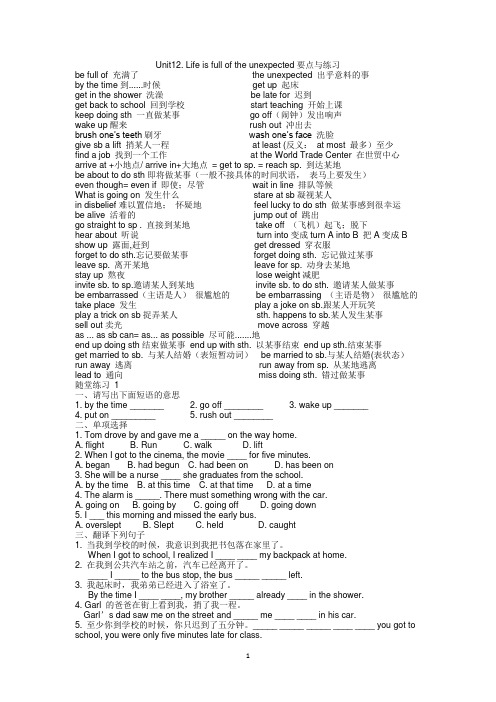
Unit12. Life is full of the unexpected要点与练习be full of 充满了the unexpected 出乎意料的事by the time到......时候get up 起床get in the shower 洗澡be late for 迟到get back to school 回到学校start teaching 开始上课keep doing sth 一直做某事go off(闹钟)发出响声wake up醒来rush out 冲出去brush one’s teeth刷牙wash one’s face 洗脸give sb a lift 捎某人一程at least (反义:at most 最多)至少find a job 找到一个工作at the World Trade Center 在世贸中心arrive at +小地点/ arrive in+大地点= get to sp. = reach sp. 到达某地be about to do sth即将做某事(一般不接具体的时间状语,表马上要发生)even though= even if 即使;尽管wait in line 排队等候What is going on 发生什么stare at sb凝视某人in disbelief难以置信地;怀疑地feel lucky to do sth 做某事感到很幸运be alive 活着的jump out of 跳出go straight to sp . 直接到某地take off (飞机)起飞;脱下hear about 听说turn into变成turn A into B 把A变成Bshow up 露面,赶到get dressed 穿衣服forget to do sth.忘记要做某事forget doing sth. 忘记做过某事leave sp. 离开某地leave for sp. 动身去某地stay up 熬夜lose weight减肥invite sb. to sp.邀请某人到某地invite sb. to do sth. 邀请某人做某事be embarrassed(主语是人)很尴尬的be embarrassing (主语是物)很尴尬的take place 发生play a joke on sb.跟某人开玩笑play a trick on sb捉弄某人sth. happens to sb.某人发生某事sell out卖光move across 穿越as ... as sb can= as... as possible 尽可能.......地end up doing sth结束做某事end up with sth. 以某事结束end up sth.结束某事get married to sb. 与某人结婚(表短暂动词)be married to sb.与某人结婚(表状态)run away 逃离run away from sp. 从某地逃离lead to 通向miss doing sth. 错过做某事随堂练习1一、请写出下面短语的意思1. by the time _______2. go off ________3. wake up _______4. put on _________5. rush out ________二、单项选择1. Tom drove by and gave me a _____ on the way home.A. flightB. RunC. walkD. lift2. When I got to the cinema, the movie ____ for five minutes.A. beganB. had begunC. had been onD. has been on3. She will be a nurse ____ she graduates from the school.A. by the timeB. at this timeC. at that timeD. at a time4. The alarm is _____. There must something wrong with the car.A. going onB. going byC. going offD. going down5. I ___ this morning and missed the early bus.A. oversleptB. SleptC. heldD. caught三、翻译下列句子1. 当我到学校的时候,我意识到我把书包落在家里了。
人教版九年级英语unit 12单词讲义

人教版九年级英语单词讲义Unit121.unexpected /ˌʌnɪkˈspektɪd/ adj.出乎意料的;始料不及的un否定前缀+expect 期望(expect sb. to do sth.____________________)+ed形容词的后缀(表示希望,期望做某事,类似用法:hope to do sth./wish sb. to do sth.)2.by the time… 在……以前(过去完成时标志词had done)3.backpack / 'bækpæk / n.旅行包back后背+pack包handbag手提包4.oversleep / ˌəʊvə'sli:p / v.(overslept/ˌəʊvə'sli:p/, overslept) 睡过头;睡得太久over超过+sleep睡觉sleep睡觉(asleep入睡fall asleep)sleepy困倦的overcome克服5.ring /rɪŋ/ v.(rang/ræŋ/,rung/rʌŋ/)(钟、铃等)鸣;响6.give ... a lift 捎……一程同义pick up:_________,___________,__________7.block / blɒk / n. 街区8.in line with (与……)成一排9.worker /'wɜ:kə(r)/ n. 工作者;工人work__________(不可数),_________(可数)+er10.stare / steə(r) / v. 盯着看;凝视stare at_________ It’s impolite to stare at others.盯着别人看是不礼貌的。
11.disbelief /ˌdɪsbɪˈli:f / n. 不信;怀疑dis否定前缀+belief(名词相信,动词believe)12.above /əˈbʌv / adv. 在上面prep. 在⋯⋯上面(正上方)在....下面(正下面)under over上方below下方13.burn /bɜ:n/ v. (burnt /bɜ:nt/, burned /bɜ:nd/;burnt, burned) 着火;燃烧sunburned晒伤14.burning /'bɜ:nɪŋ/ adj.着火的;燃烧的15.alive /ə'laɪv / adj. 活着;有生气的a+live(生活)active活跃的16.airport /'eəpɔ:t/ n.机场air空气+port地点后缀by air坐飞机17.till / tɪl/ conj. & prep. 到;直到until直到18.west / west / adv. 向西;朝西adj. 向西的;西部的n. 西;西方east东south南north北变形容词在后加ern western西方的19.cream / kri:m / n. 奶油;乳脂ice-cream冰淇淋20.workday /ˈwɜ:kdeɪ/ n.工作日weekday_________ weekend________ 写出星期日至星期六:21.pie / paɪ/ n. 果馅饼;果馅派apple pie苹果饼22.show up 赶到;露面We waited for two hours but Mr. Shao didn't show up.我们等了两小时,邵老师没出现。
新概念英语青少版入门级A_Unit_12

B. Play‘Guess the job.’
C Listen and tick.
D. Play‘Guess the job.’
Lesson 3
It’s a dog.
Pop is a panda.
She isn’t a nurse.
Are you a policeman?
Is Max a monkey?
Is she …? 她是…?
Yes,she is .是的,她是 No, she isn’t 不,她不是。
Is it…?它是…?
Yes,it is. 是的,它是 No,it isn’t.不是,它不是。
A Listen read and say
让我们一起 玩:“猜职业”的
游戏吧!
猜一下
No,she isn’t! Ha!Ha!
Are you …? 你是…?
Yes,I am . 是的,我是。
No,I’m not 不,我不是。
Am I …? 我是…?
Yes,you are.是的,你是 No ,you aren’t.不,你不是。
Is he …? 他是…?
Yes,he is. 是的,他是。 No, he isn’t 不,他不是。
policewoman/pəˈliːswʊmən/
n.女警察; 女警官
She is a policewoman. =She’s a policewoman. 她是一名女警察。
postman
/ˈpəʊstmən/ n.邮递员,邮差
He is a postman. =He’s a postman. 他是一tor. = He’s a doctor. 他是一名医生。
nurse
英 /nɜ:s/ n.护士,看护;
《高级英语读写译教程》Unit 12 参考译文及答案

Unit TwelveSection AThe City 参考译文城市[1] 从某种意义上来说,我们可以把美国城市存在的所有问题归咎于一个根源:我们美国人不很喜欢我们的城市。
[2] 这乍看起来荒诞不经。
毕竟我们中四分之三的人目前住在城市,并且每年有更多的人涌进城市。
据说,我们的城市问题正在受到美国政府更多的关心。
专家学者们发现了城市研究中的一个全新领域。
[3] 然而,从历史角度来看,这是千真万确的:在美国人的心理上,城市已经是一个基本上值得怀疑的社会,它充斥了欧洲的腐败现象,完全缺乏边远地区的那种空旷、清纯感和乡村的景色。
[4] 我不敢自命为美国人生活的中研究城市历史的学者。
但是我担任公职十三年,先是美国司法部的一名官员,然后任过国会议员,现在是美国最大城市的市长。
我的经历清楚地告诉我,美国人的思想主流中始终贯穿着一种强烈的反抗城市的观念。
到美国定居很多是因欧洲工业中心的恶劣条件造成的;在美国,人们可以获得土地,可以不受城市的腐败影响而日臻完善,这使多数理论认为在美国是有自由的。
[5] 这和现代城市的尴尬处境有何关系呢?我认为有很大的关系。
因为事实上,美国,特别是历史性地确立了我国优越地位的联邦政府,从来没认为美国的城市值得改造,最起码还没有到需要花费基本资源来改造的地步。
[6] 人们对城市的厌恶出现在来到美国之前。
当工业化驱使欧洲的工人进入欧洲大陆的主要城市时,就出现一些书和小册子,抨击城市是犯罪、腐败、污秽、疾病、罪恶、放荡、颠覆和高物价的根源。
诸如《摩尔·弗兰多斯》之类的一些最早的英国小说的主题都是有关一个单纯的乡下青年来到大城市,遭受到各种恐怖的威胁,最后又回归到乡村生活中去。
[7] 欧洲人的正确看法似乎证实了这一位法国人的观点,他写道:“在乡村,人的思想自由,心情舒畅;但是在城市里,朋友和熟人、自己和他人的事务、荒谬的争吵、礼仪、拜访、胡扯闲聊,以及其他许许多多的纨绔习气和消闲娱乐占去了我们的绝大部分时间,使我们无暇更好地进行必要的工作。
七年级下册英语unit12笔记

七年级下册英语unit12笔记Unit 12: Healthy Living (健康的生活)I. Vocabulary (词汇)1. Diet and Exercise (饮食和运动)- balanced diet (平衡饮食):Eating a variety of foods from different food groups in appropriate portions to ensure getting all the necessary nutrients.- junk food (垃圾食品):Unhealthy food that is high in calories but low in nutritional value.- calorie (卡路里):A unit of energy measurement used to quantify the energy content of food.- aerobic exercise (有氧运动):Physical activity that increases the heart rate and improves cardiovascular fitness, such as running or cycling.- strength training (力量训练):Exercises that target muscle groups to increase strength and tone, such as weightlifting or push-ups.2. Health and Wellness (健康和养生)- stress (压力):Mental or emotional strain caused by difficult or demanding circumstances.- relaxation (放松):The state of being free from tension and stress.- sleep deprivation (睡眠不足):The condition of not getting enough sleep, which can lead to various health problems.- hygiene (卫生):Practices that promote cleanliness and prevent the spread of diseases, such as washing hands and brushing teeth.- immunity (免疫力):The ability of the body to resist and fight infections and diseases.II. Grammar (语法)1. Modal verbs (情态动词)- can (能够):Used to express ability or possibility.- e.g., I can swim.- should (应该):Used to give advice or make suggestions.- e.g., You should eat more fruits and vegetables.- must (必须):Used to express obligation or necessity.- e.g., You must drink plenty of water.2. Present Continuous Tense (现在进行时)- Used to describe actions happening at the current moment.- Structure: subject + am/is/are + verb + ing.- e.g., She is running in the park now.III. Reading Comprehension (阅读理解)1. Benefits of Exercise (运动的好处)Regular exercise has numerous benefits for both your physical and mental health. It helps maintain a healthy weight, reduces the risk of chronic diseases, and strengthens your muscles and bones. Exercise also improves mood, relieves stress, and promotes better sleep. Therefore, it is essential to incorporate regular physical activity into your daily routine.2. Importance of a Balanced Diet (平衡饮食的重要性)A balanced diet is crucial for maintaining good health. It provides the necessary nutrients, vitamins, and minerals that your body needs to function properly. Eating a variety of foods from different food groups ensures that you get a balance of carbohydrates, proteins, fats, vitamins, and minerals. Avoiding junk food and sugary drinks is also important to prevent weight gain and reduce the risk of diseases such as diabetes and heart disease.IV. Writing Practice (写作练习)Topic: My Healthy Living Plan (我的健康生活计划)我正在制定一个健康的生活计划,以改善我的身体和心理健康。
自考英语二 课件 Unit 12
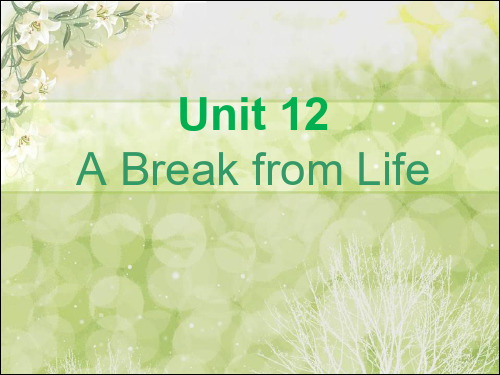
The human learns partly by nature, partly by nurture. 人的学习能力部分是先天的,部分是后天培育的。
• nature and nurture 先天与后天,遗传与环境;先天 遗传说和后天培养说
2. worthwhile adj. 重要的;令人愉快的;有趣的;值得花时间(或 花钱、努力等)的
e.g.: He wanted to do a worthwhile job. 他想找一个值得做的工作。 It is worthwhile to buy the book. 这本书值得买。 衍生 worth adj. having a certain value 有某种价值 e.g.: Our house is worth about 60000 pounds. 我们的房子约值 60000英镑。 worthy adj. deserving sth. or to do sth. 应得某事物;值得做某事 ~ of sth./to do sth. e.g.: Their efforts are worthy of your support.他们这样努力应得到 你的支持。 He is worthy to receive such honor.他应该得到这种荣誉。
• 12. awareness n. knowing something;knowing that something exists and is important 知道;认识;意识 e.g.: environmental/political/social awareness. Health officials have tried to raise people's awareness about AIDS.
Unit 12【单元知识点复习】九年级英语全一册单元复习(人教版)

单元复习12 Unit 12 Life is full of the unexpected
词汇
单词
1._b_a_c_k_p_ac_k_背包;旅行包 2._o_v_e_r_sl_e_e_p 睡过头 3.__m__is_s___错过;未得到 4._u_n_e_x_p_ec_t_ed 出乎意料的;始料不及的 5.__b_l_o_c_k__街区 6.__w_o_r_k_e_r_工作者;工人 7.__s_ta_r_e___ 盯着看;凝视8._d_is_b_e_l_ie_f_不信;怀疑 9.__a_b_o_v_e__在上面;向上面 10.___b_u_rn___着火;燃烧 11.__a_l_iv_e___ 活着;有生气的12.___t_i_ll___ 到;直到 13.__w__e_st___向西;朝西adj. 向西的;西部的n. 西;西方 14.__c_r_e_a_m__奶油;乳脂 15.___b_o_s_s__老板;领导 16.___p_ie____果馅饼;果馅派 17.__c_o_u_rs_e__课程 18.__b_e_a_n___豆;豆荚 19.__m_a_r_k_e_t _市场;集市
单词
Ⅱ. 用括号内所给动词的适当形式填空。 11. We had _p_a_in_t_e_d__(paint) the house before we m__o_v_e_d___(move) in. 12. Tom said heh_a_d__re_a_d__(read) the book twice. 13. Most of my good friends _h_a_d_l_e_ft__(leave) when I _a_rr_i_v_e_d__(arrive) at the party. 14. By the time I _w_a_lk_e_d___(walk) into the store,someone _h_a_d_b_o_u_g_h(bt uy) the jeans I wanted. 15. My mother h_a_d__c_o_m_e_(come) back from the market when I ___g_o_t___(get) up.
Unit12词汇,短语,句型--人教版英语九年级全册

教学服务质量家校互动卡初三 Unit 12 Life is full of the unexpected.(过去完成时)单词1.ring-rang-rung v.①(钟,铃等)鸣,响了②给......打电话n. 戒指;环,圈2.leave-left-left v.①离开 leave for sp 动身去某地②丢下,落下 leave sth +地点状语3.backpack n.旅行包4.oversleep-overslept-overslept v.睡过头5.disbelief n.怀疑,不信任6.fool ① n.蠢人,傻瓜②v.捉弄......联想:foolish adj.愚蠢的,傻的7.cancel v.取消8.disappear v.消失,不见9.embarrassing adj.使人害羞的;令人尴尬的,惭愧的10.west ① n. 西方②adj.西部的,向西的③ adv.向西,朝西11. believable adj.可信的;可信任的---unbelievable adj.难以置信的不规则动词:sell-sold-sold give -gave-given get-got-got go -went-gonehear-heard-heard hit-hit-hit feel-felt -felt wake-woke-woken lead-led-led词组1.make up an ending 编造一个结尾 2.be about to do 即将要做某事3.put on 穿上;戴上4.rush out of 从......里冲出来5.give sb a lift =give sb a ride捎某人一程6.end up doing 以......告终7. be filled with =be full with 充满...... 8.go off 响铃9.stare at sth 盯着......看 10.have a chance to do 有机会做...... 11.play a joke/trick on sb 对......开玩笑 12.fool sb into doing sth 欺骗某人做某事13.make a fool of sb 取笑,捉弄某人 14.stay up =stay up late 熬夜15.no more=not ...any more 再也不...... 16.sell out 卖光,售完17.hundreds of 数以百计的 18.run away from 从......逃脱;逃避,回避19.hand in 上交 20.run out of 用光21.decide to do =make a decision to do 决定要做......22.arrive in/at+地点=get to+地点=reach+地点23.in disbelief 怀疑地,不敢相信地 24.get back to school 回到学校25.take off 起飞 26.turn into...变成......27.hear a loud sound 听到一声巨响 28.lead to sp 通向......29.walk home from school 放学步行回家 30.finish doing 完成做......重点1.What back luck.讲解:感叹句本句为what引导的感叹句,后面省略了I had,其中what修饰不可数名词luck。
九年级英语unit12单词表
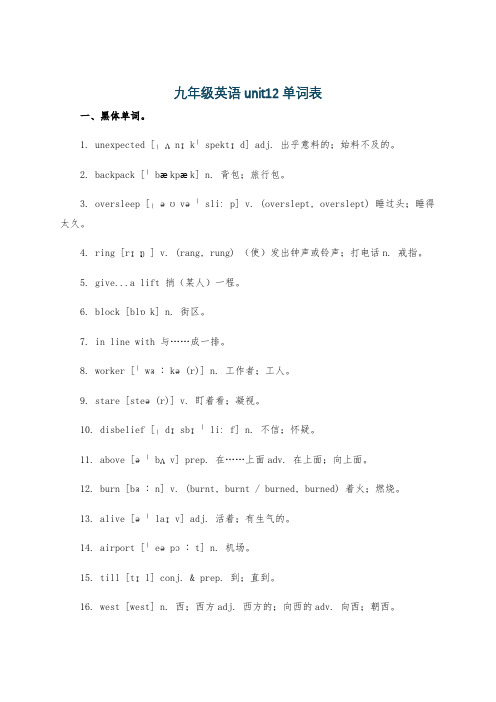
九年级英语unit12单词表一、黑体单词。
1. unexpected [ˌʌnɪkˈspektɪd] adj. 出乎意料的;始料不及的。
2. backpack [ˈbækpæk] n. 背包;旅行包。
3. oversleep [ˌəʊvəˈsliːp] v. (overslept, overslept) 睡过头;睡得太久。
4. ring [rɪŋ] v. (rang, rung) (使)发出钟声或铃声;打电话n. 戒指。
5. give...a lift 捎(某人)一程。
6. block [blɒk] n. 街区。
7. in line with 与……成一排。
8. worker [ˈwɜːkə(r)] n. 工作者;工人。
9. stare [steə(r)] v. 盯着看;凝视。
10. disbelief [ˌdɪsbɪˈliːf] n. 不信;怀疑。
11. above [əˈbʌv] prep. 在……上面adv. 在上面;向上面。
12. burn [bɜːn] v. (burnt, burnt / burned, burned) 着火;燃烧。
13. alive [əˈlaɪv] adj. 活着;有生气的。
14. airport [ˈeəpɔːt] n. 机场。
15. till [tɪl] conj. & prep. 到;直到。
16. west [west] n. 西;西方adj. 西方的;向西的adv. 向西;朝西。
二、白体单词。
1. by the time 在……以前。
2. gotten [ˈɡɒtn] v. (get的过去分词)得到。
3. fool [fuːl] n. 蠢人;傻瓜v. 愚弄。
4. costume [ˈkɒstjuːm] n. (特定种类的)服装;(统指)服装。
5. embarrassed [ɪmˈbærəst] adj. 窘迫的;害羞的。
- 1、下载文档前请自行甄别文档内容的完整性,平台不提供额外的编辑、内容补充、找答案等附加服务。
- 2、"仅部分预览"的文档,不可在线预览部分如存在完整性等问题,可反馈申请退款(可完整预览的文档不适用该条件!)。
- 3、如文档侵犯您的权益,请联系客服反馈,我们会尽快为您处理(人工客服工作时间:9:00-18:30)。
10. 一段时间+ ago : …以前(用在一般过去时) eg: two hours ago : 两个小时以前 three weeks ago: 三个星期以前
11. put up:搭建,举起, 张贴 put up the tent: 搭帐篷 put up your hand(s): 举手 put up the notice: 张贴通知
move away:移走 move out:移出 (moved adj 感动的) 15. stat to do sth : 开始做某事 16. wake sb up:把某人弄醒(表动作)
(——get up )
shout to: 指“对某人大声叫喊”,目的是让别人听 见 9. fly 1) v. 飞 (flies, flew) fly to + 地点 坐飞机去某地 =take a plane to + 地点
eg. He flew to Beijing yesterday.
= He took a plane to Beijing yesterday.
eg. I bought a pair of glasses as a gift for my
father. * as +职业,用途,特点等
eg. She works as a guide in the park.
4. tired adj. 疲倦的,疲劳的。 常与be, get, feel, look等连用
eg. I am so tired. * be tired of sth/sb :对某人/物感到疲倦 * get tired :变得疲劳,强调动作和过程 5. stay v. 1) 停留,待
eg. I stayed at home last Sunday.
He stays in China this week. * stay up 熬夜 2) 保持,处于某种状态 + n./adj.
1. camp 1) v. 扎营 go camping 去露营
2) n. 野营,营地 summer camp 夏令营
2. sheep n. 羊,绵羊 (单复数同形) one shee形的名词:people,fish,Chinese, Japanese,deer 3. as prep. 作为
12. help each other: 互相帮忙 learn from each other: 互相学习 look at each other: 互看
13. surprise n. 惊奇,惊讶 *to one’s surprise :令某人惊讶的是(单独使用,
放句首,用逗号和后面成分隔开)
eg. To my surprise, he can speak Japanese. *surprised adj. (修饰物) surprising adj.(修饰人) 14. move to + 地点: 搬到…
stay friends 6. away adv. 离开,远离。与V.连用,构成动副短语。
take away 拿走 run away 逃走
7. baby 1) adj. 幼小的,小型的 the baby cat 幼猫 the baby car 小型车
2)c.n. 婴儿 (babies)
eg. She has a baby. It is five months old. 8. shout at: 指因生气或愤怒“冲别人大声吼叫”
